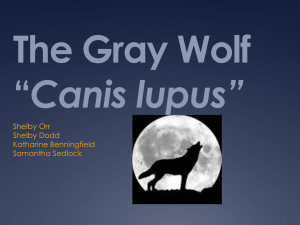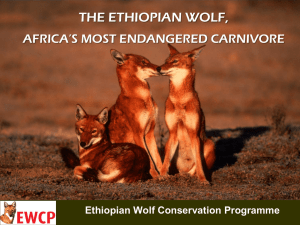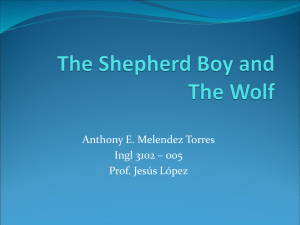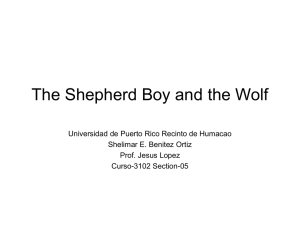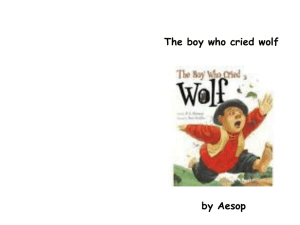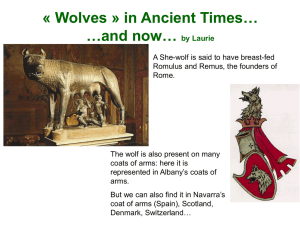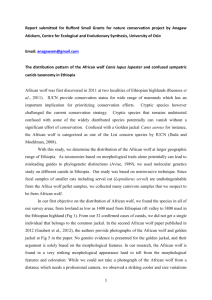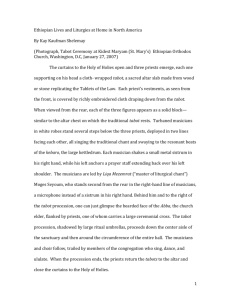THE ETHIOPIAN WOLF
advertisement
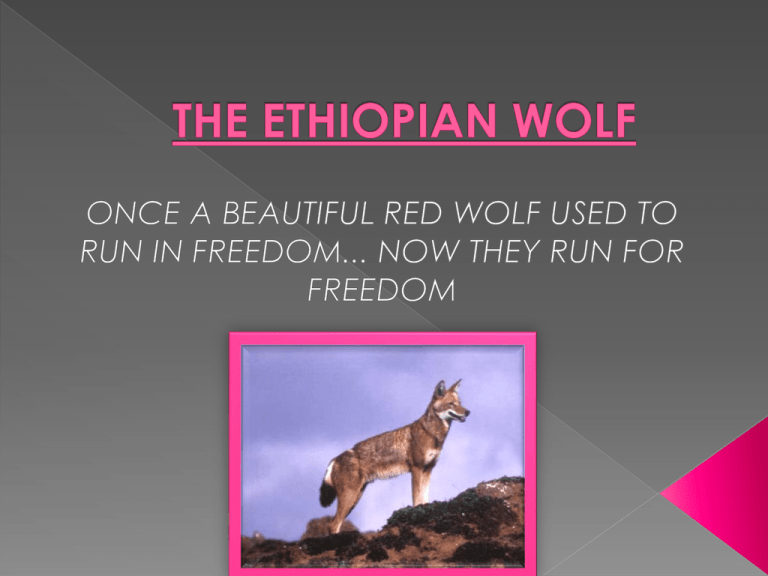
The Canis Simensis comes from the Animalia kingdom Chordata phylum (vertebreta) Mammalia class Carnivoria order Canidae Family From KINGDOM ANIMALIA To Canidae Family Found in Africa North of Rift Valley All in Ethiopia Lives in “treeless areas” or deserted areas where rough terrestrial land lies Its population is less than 600 and the number decreases every year from hunting •Overhead view of The North part of Rift Valley in Ethiopia. 1. 2. 3. Ethiopian Wolves are becoming more and more endangered because: Habitat Loss Being hunted for medical reasons and sport Not enough supply of food 60% of the land where the Canis lives is arable land Because of this there is barely any more prey to feed on because they have all died or moved away from the land Surviving in the Bale mountains (where they mostly live) is a hard task at hand because of rough conditions The Canis’s liver is believed to have medical properties to cure some illnesses It is also not important to the culture of Ethiopia therefore they are hunted as sport It’s red-orange fur is also very valuable too It’s becoming harder everyday for the Canis to find food in the Bale mountains Food such as hares or moles moved out of the Rift Valley area and moved south while the Canis moved to the mountains only to find grass rats Packs became smaller and so its harder to catch they’re prey and defend against predators • Bale Mountains area where the Ethiopian Wolf is finding prey If the Ethiopian Wolf became extinct then... 1) There goes their useful medical properties in their liver; then people will become sick (sick with rabies) 2) The more people sick the more diseases Ethiopia will have 3) The more diseases in Ethiopia we will then have a huge pandemic 4) We will also not have our red fur coats 5) Ethiopia will look for another red-fur animal 6) That animal will soon then become endangered or even extinct fulvorufula The Canis Simensis is from the Chordata phylum Three other species from the Chordata phlyum would be: Puma Concolor, Lepus Starcki and Urus Arctos. All of these species have a central nervous system All of these species has tails Complete digestive system (loosely similar to our digestive system) Some are vertebrate and others are invertebrate Most have an exoskeleton and a dorsal neural tube Biodiversity is like or maybe even exactly like multiculturalism in our lives. Without it we would not have our favourite and delicious foods in our lives or those heart warming, fun filled holidays either. See biodiversity gives us life essentially. Every organism on this planet has something to do with the way we breathe, sleep or even eat. Every organism helps us grow, physically and mentally. Without organisms such as archaebacteria we would’ve probably never created these theories of common ancestors. Without biodiversity we would most likely be dead right now. We should never underestimate the knowledge of biodiversity, for instance the Ethiopian Wolf probably seems unimportant in our lives, but by saying that you are pretty much saying that the whole Canis family is not important, and by saying that you’re saying that the whole Kingdom Animalia isn’t even important either! Think about it carefully, biodiversity has to do with the way organisms think, breathe and evolve. Is it not important to understand the way things work than be ignorant and watch how a girl broke a nail? I think it’s important to understand the way things work. If I see a machine and I have no idea how it functions then I’ll not work on it. Though my curiosity will kick in and I will want to know how it works. Same concept with biodiversity, our human instinct is to know how everything works and if anyone out there in the world thinks that biodiversity is one of those exceptions where you don’t need to know how it works and just assume everything about it... Well then that’s just really sad. So when we are thinking about the way things live, grow and evolve don’t underestimate it because everything in biodiversity is always connected to our everyday lives. Dear Member of Parliament, My name is Andrew Rajcoomar, and I am part of a group to protect the wildlife of many endangered species. Especially the Ethiopian wolf. The Ethiopian wolf is like any other endangered species when thought of at first but as I delved deeper into important facts about this animal I realized that this wolf is very important to our society. The Ethiopian wolf is unique in a medical way meaning that its liver carries important medical properties that is used in many illnesses in Ethiopia. If this wolf dies then there goes an important medical property, off the face of this planet. If we keep killing off these animals and brushing them aside then there will be more animals we keep brushing off aside and I think we should stop right here right now and help the Ethiopian wolf. We can deem the Bale Mountains area in Ethiopia as a reservation site for the wolves, that way there will be no hunting, poaching or growing of arable lands in the area. That way the Ethiopian wolf can live freely, hunt freely and reproduce freely. There is only 100 Ethiopian wolves that are accounted for in this world, sadly this number decreases everyday! We need to act now and make reservation areas, stop the growth of construction sites, of arable land! We need to act now! Sincerely, Andrew Rajcoomar http://www.animalinfo.org/species/carni vor/canisime.htm http://animals.about.com/od/identifying animals/p/chordates.htm http://animals.galegroup.com/web/grzi meks/animals/Canis_simensis?searchTer ms=Ethiopian+wolf http://www.animalcorner.co.uk/wildlife/ wolves/wolf_ethiopian.html
